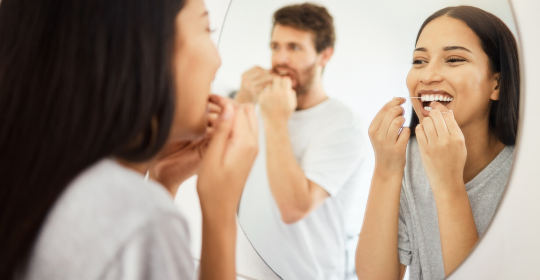 20 September 2022
20 September 2022
Once children become older and more independent, there’s often an increase in dental health problems. Studies have shown that young Australian adults between 18-24 years have more decay than most 12 year olds.[1] The causes for this are unsurprising, with a flow-on effect from less parental supervision and reminders about tooth cleaning, eating a healthy diet and ensuring regular dental appointments.
Remember these tips:
- If you have a late night, make it a tiny bit later by brushing your teeth before falling asleep. Tooth decay is common overnight when saliva flow slows down. Saliva has a protective effect on tooth enamel.
- Wear a mouthguard if you play sport. And remember to wear it during games and practice. If you have a tongue piercing, be aware this could chip your teeth and damage your gums.[2] Take out any tongue jewellery before going to sleep. Keep a watch on the piercing site for any redness or signs of infection.
- Make a habit of looking in your mouth, at your teeth, gums and tongue. One sign of early decay is white spots near the gum line. Gum swelling, bleeding and redness are all signs of infection and gum disease. See your dentist if you have any changes in your mouth or teeth or have any pain.
- Understand that smoking and alcohol can affect a healthy mouth. Speak with your dentist about ways to minimise tooth decay and oral health problems.
- Bad breath (halitosis) has many causes, though poor oral hygiene is a major reason. Bad breath can be very embarrassing though once the cause is found, the right treatment can be very effective. Brush your tongue as well as your teeth. Use a soft brush and tongue scraper as well. Chew sugarless gum after eating if you don’t have time to brush and swish your mouth with plain water after tea and coffee.
- If you have braces, you’ll need to be especially careful with brushing to keep your teeth and gums healthy. Experiment with different types of floss, fluoride mouthwashes and protective wax.

The basics of having a healthy mouth
Brushing twice a day with fluoride toothpaste is needed everyday throughout life. Brushing helps to remove food and plaque which leads to tooth decay, and fluoride helps to harden tooth enamel. Though brushing is only part of the equation. Flossing is equally important because it helps to remove plaque and food between the teeth.
Have regular dental check-ups. See your dentist every six months, or more frequently if advised to.
Think about what you’re putting into your mouth. Sweet foods, which are high in sugar plus sticky carbohydrates, feed into the cycle of sugar + bacteria = acid which causes decay. Snacking can also increase the risk of decay because of frequent acid attacks. Try to stick to eating 3 main meals + 2 snacks/day with a break of a few hours between.
Never share a toothbrush. Sharing saliva is a perfect way of sharing bacteria and this is never something you want to share!
Drink tap water if you’re thirsty. Soft drinks, juice and energy drinks are all high in sugar. Bottled water doesn’t contain fluoride; this mineral has a protective effect on tooth enamel. Most importantly book your dental check-ups at least twice per year. Your at home cleans can only do so much when it comes to keeping your teeth healthy and regular visits to your dentist will go a long way to ensuring your teeth and gums stay healthy for years to come.
[1] https://www.colgateprofessional.com.au/education/patient-education/topics/life-stages-health/oral-health-for-teens-and-20s
[2] https://www.colgate.com/en-us/oral-health/conditions/mouth-sores-and-infections/the-signs-of-an-infected-tongue-piercing-0415





